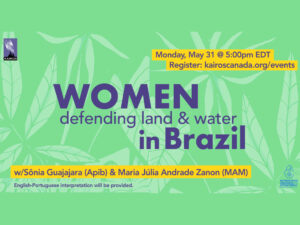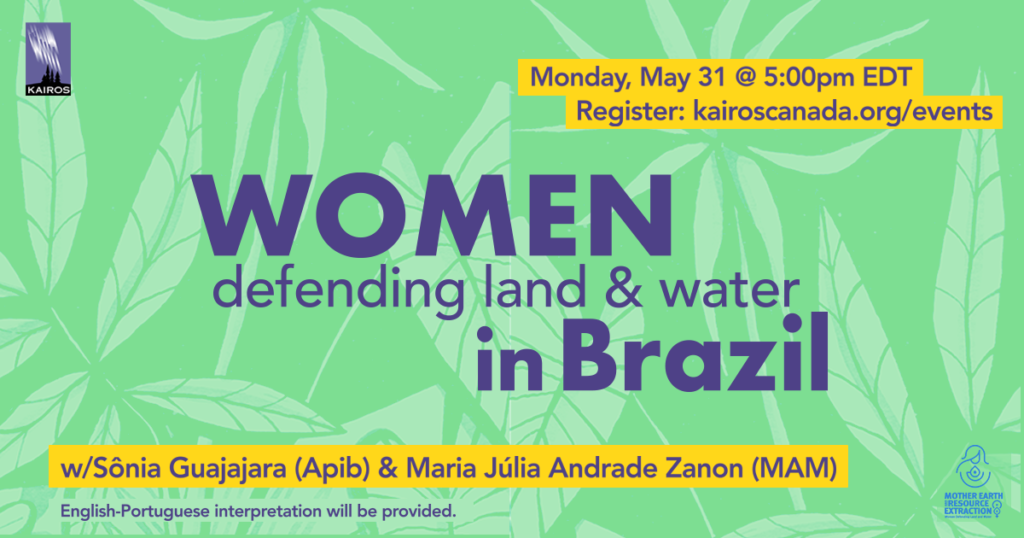The gendered impacts of the mining industry in Brazil

The impacts of the mining industry in Brazil are best known by the two major tailing dam bursts that took place in Mariana (2015) and Brumadinho (2019) in the state of Minas Gerais. These human-made disasters took the life of hundreds of people and caused massive environmental destruction. However, well before these breaches, the mining industry had been a source of afflictions and human rights abuses experienced by local communities. These other impacts – more subtle and ongoing – have not been receiving the same widespread public attention. They include water contamination, atmospheric pollution, deforestation, forced displacement of local communities, sexual exploitation, and political persecution against community leaders.
Mining companies use the argument that they will bring economic development to bargain with governments, while belittling the concerns raised by civil society organizations. In recent years, mining companies have found openings to advance their projects in Brazil. The current Brazilian federal government, for example, advocates for easing legislation that regulates mining activities in Brazil, including on Indigenous lands, which is currently forbidden by law. The government is supporting Bill 191/2020 to allow mining activities on Indigenous lands.
Even though Bill 191/2020 has not yet passed, the mere fact that the federal government is supporting it has caused an increase in bids to mine and in actual illegal mines on Indigenous lands. In addition to the safety risks faced by Indigenous communities, illegal mining activities are also causing serious damages to their health. The mercury used in artisanal and small-scale gold mining operations contaminates fish that are a source of food for Indigenous peoples and other communities who live close to the rivers. About 200 tons of mercury are emitted across the Amazon region every year. Brazil’s Special Secretariat of Indigenous Health conducted research with a group Munduruku Indigenous people and found that 99% of them had mercury levels in their blood that exceeded a tolerable or acceptable amount. Dr. Erik Jennings, responsible for this research, states that the most serious cases are found among children, due to the high levels of mercury in their mothers’ blood. This is because the metal crosses the placenta, causing irreversible damage to the nervous system. Mercury can also lead to heart, thyroid, and immune system problems in babies.
Because the mining industry in mostly driven by men and structured according to men’s necessities, women who work in the large mining companies face extra challenges, such as lack of women’s bathrooms, sexual harassment, lower wages, and misogyny.
The largest mining company in Brazil, Vale, is domestic. However, multinational mining corporations are increasing their presence in the country. There are about 30 Canadian corporations exploring minerals in Brazil. One of the most prominent of them, Belo Sun, is planning to advance a major gold mining project in the Xingu region. Despite the attempts by the Federal Public Prosecutor’s Office to impede it, the company is already prospecting for gold in areas that overlap Indigenous lands. If approved the project would be the largest gold mining project in Latin America.
The most recent environmental disaster allegedly caused by a Canadian mining company in Brazil happened last March 25, when a tailings dam at the Aurizona mine overflowed in the municipality of Godofredo Viana, in Maranhão state. In addition to contaminating surrounding rivers, the overflow left about four thousand people without potable water. Aurizona is a subsidiary of Equinox Gold Corporation and is one of the biggest gold mines in the country.
Canadian mining companies receive special attention from the Brazilian government. In 2017, when the Temer administration (2016-2018) tried to extinguish a major ecological reserve, Canadian mining companies were informed of that decision five months before civil society was. In March 2019, less than three months after the current president’s inauguration, Brazil’s Minister of Mines and Energy, Bento Albuquerque, traveled to Canada for the annual conference of the Prospectors & Developers Association of Canada to promise investors that the necessary reforms would be enacted to open opportunities for new investments.
In the face of this political context, environmental defenders continue in their struggles for Indigenous and environmental rights—for which they are often criminalized, if not threatened, attacked, or killed. Brazil is one the countries earmarked by Frontline Defenders for the number of human rights defenders murdered in 2020.
To learn more about how local communities, especially women environmental rights defenders, are resisting the impacts of the mining industry in Brazil, please join us on Monday, May 31, at 5:00PM (EDT) for the public launch of MERE Hub Brazil, “Women Defending Land and Water in Brazil,” which will feature Sonia Guajajara of the Articulation of Indigenous Peoples of Brazil, and Maria Júlia Andrade Zanon of the Movement for Popular Sovereignty on Mining.
Mother Earth and Resource Extraction: Women Defending Land and Water (MERE Hub) is a digital platform on the gendered impacts of resource extraction, created for and in consultation with women land defenders from across the globe who are mobilizing around large-scale resource extraction. MERE Hub builds on KAIROS’ work with partners on these issues. Initially launched in November 2019 with the Latin American phase and followed by the Canada phase in June 2020, this third phase—MERE Hub Brazil—includes resources in Portuguese for land defenders based in Brazil. A number of videos, including the introductory video, the Gendered Side of Corporate Accountability can be found, in English, on MERE Hub.
Register now for Women Defending Land and Water in Brazil!
By Fabricio Teló, KAIROS Volunteer









